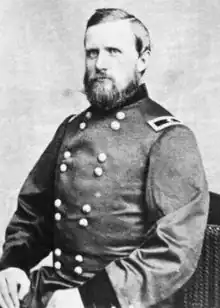John Parker Hawkins
John Parker Hawkins (September 29, 1830 – February 7, 1914) was a career officer of the United States Army who served as brigadier general during the American Civil War, in which he served as a commissary officer and as a commander of colored troops. After the war he remained in the army and rose to the position of Commissary General of Subsistence of the United States Army.
John Parker Hawkins | |
|---|---|
 Brig. Gen. John Parker Hawkins | |
| Born | September 29, 1830 Indianapolis, Indiana |
| Died | February 7, 1914 (aged 83) Indianapolis, Indiana |
| Place of burial | Crown Hill Cemetery, Indianapolis, Indiana |
| Allegiance | United States of America Union |
| Service/ | United States Army Union Army |
| Years of service | 1852–1894 |
| Rank | |
| Unit | 2nd US Infantry 6th US Infantry |
| Commands held | 1st Brigade, USCT 1st Division, USCT Commissary General of Subsistence |
| Battles/wars | American Civil War |
| Relations | Louisa Hawkins Canby (sister) Edward Canby (brother-in-law) |
Early life
Hawkins was born in Indianapolis, Indiana, the son of John Hawkins and Elizabeth (née Waller); his elder sister was Louisa Hawkins Canby (who married Major General Edward Canby). He graduated from West Point in 1852 as 40th out of 43 cadets, and joined the 2nd US Infantry. When the Civil War began in 1861 he was a First Lieutenant and Regimental Quartermaster of the 6th US Infantry.[1]
Civil War
Parker was promoted to captain on August 3, 1861, and was posted to Missouri to serve as a Commissary of Subsistence. He was sent to western Tennessee in 1862, and was promoted to lieutenant colonel on November 1 that year. The following month he became the Commissary General for Gen. Grant´s Army of the Tennessee. On April 25, 1863, President Abraham Lincoln appointed Hawkins Brigadier General in the U.S. Volunteers, with effect from April 13, 1863.[2] However, the U.S. Senate returned the nomination to the President on April 1, 1864. The following day Lincoln renominated Hawkins and the Senate subsequently confirmed the appointment on April 18, 1864.[2]
Hawkins was assigned to command a brigade of the United States Colored Troops (USCT) and the District of Northeastern Louisiana. In April 1864 he assumed command of the 1st Division of the USCT. He and his division distinguished themselves in the assault at the Battle of Fort Blakely on April 9, 1865, which resulted in the capture of Mobile, Alabama. Hawkins was mustered out of the Union Army volunteer service on February 1, 1866.[2]
In the wave of the mass promotions at the end of the war Hawkins was promoted to the brevet grade of major general in both the U.S. Volunteers and the regular army.[3]
Later life
Hawkins stayed in the army and reverted to his regular rank of captain in the Subsistence Department. He married Jane Bethuxe Craig, daughter of former Chief of Ordnance Colonel Henry Knox Craig, on October 10, 1867. He served in a number of postings and received a series of promotions: to major on June 23, 1874; to lieutenant colonel on September 3, 1889; and colonel on March 12, 1892.[1] He was appointed Commissary General of Subsistence of the U.S. Army with the rank of brigadier general on December 2, 1892, and remained in this position till he resigned on September 29, 1894, aged 64.[1] He died on February 7, 1914, in Indianapolis, Indiana, outlived by his daughter, and was buried at the local Crown Hill Cemetery. His wife had predeceased him on April 13, 1913.
Released works
- Memoranda concerning some branches of the Hawkins family and connections (1913)
Notes
- Eicher, p. 288
- Eicher, p. 722
- Warner, pp. 218
References
- Eicher, John H., and David J. Eicher, Civil War High Commands. Stanford: Stanford University Press, 2001. ISBN 0-8047-3641-3.
- Warner, Ezra J. Generals in Blue: Lives of the Union Commanders. Baton Rouge, Louisiana: LSU Press. 1964. ISBN 0-8071-0822-7.
Additional source listed by alleylaw.net:
- The Twentieth Century Biographical Dictionary of Notable Americans: Volume V H Hawkins, Micajah Thomas page 146
External links
- Works by or about John Parker Hawkins at Internet Archive
- Pictures of John Parker Hawkins at the Wayback Machine (archived February 8, 2008)
- John Parker HAWKINS Who's Who Within the Waller Family
- John Parker Hawkins at Find a Grave